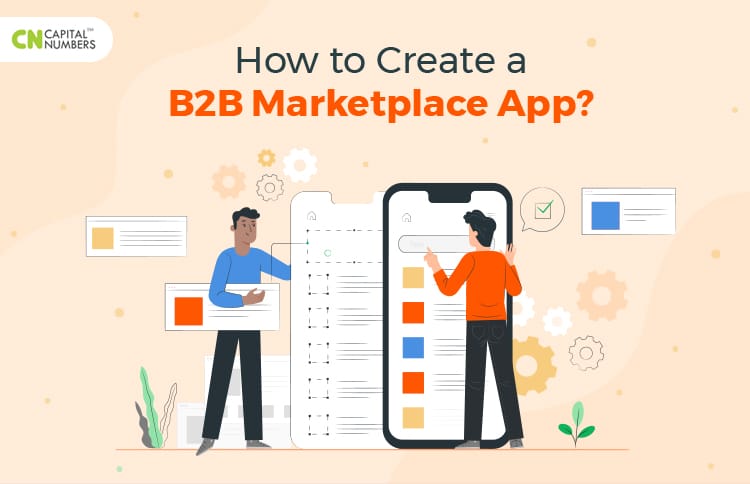How to Create a B2B Marketplace App?
Table of Contents
Through all the skepticisms caused by COVID-19, it’s evident that this pandemic has speeded up the otherwise gradual rise of the B2B digital marketplace. Today, the urgency to invest in B2B eCommerce has shot up because it represents the line dividing organizations that can weather the financial storm caused by the pandemic and those that struggle to stay afloat.
Across B2B segments, ranging from mining, machinery, construction to chemicals, savvy companies are now looking to roll out ‘Amazon-esque’ online portals to boost their sales. A Forbes report states that B2B eCommerce will witness the most significant eCommerce growth between 2020 to 2025. Forrester also predicts that the US B2B eCommerce market will reach US$1.2 trillion in 2022. Moreover, experts forecast that B2B eCommerce, when compared to B2C, will grow twofold in the future, clearly indicating an upward trend that businesses must focus upon.
These projections reflect the need for companies to develop their online B2B marketplace to outpace competitors. However, what’s important is that one size does not fit all. Therefore, the key is to understand your users’ needs, expectations, and pain points and then create an online B2B marketplace that is distinct, seamless, and free from all snags.
But, before you start, you need to determine your project niche. That is, you may choose between the following:
| Product/Service
Firstly, you need to decide whether businesses will use your platform to create a marketplace for products or services. |
Specific Industry
Next, you need to choose the group of goods/services (e.g., engineering equipment, brokering websites, etc.) that will be best to bet on. |
Region/Language
It would help if you also decided whether your marketplace will be region/language-specific with localized products for sale. |
Once you’ve decided on your niche, choose the most suitable monetization model from options such as the following:
| Subscription-based
This is where you charge your users regular fees (yearly, monthly, or any other) for accessing the marketplace. (For example, Sharetribe) |
Commission-based
This model lets you charge your users for each transaction on the marketplace. (For example, Amazon) |
Mixed Revenue
This allows you to charge your users listing fees and commissions, thereby earning revenues from multiple streams. (For example, Etsy) |
Next, you must look at the key capabilities that you need to add to run your B2B marketplace successfully. Some of these may include:
| Multi-vendor Capabilities
Each vendor must seamlessly manage his company details, contact numbers, product pages, and catalogs on your marketplace. |
Self-service Pricing
B2B sellers require control over pricing configuration, so a real-time pricing integration within the backend system would be great. |
Advanced Filters and Searches
Enable advanced filtering with smart autocomplete searches to offer a smooth buying experience. |
| Quote RFP/Order Negotiations
The B2B space involves multiple buyer-seller negotiations before the final purchase. So, integrate UX best practices to provide a smooth transition from RFQ to the final quote. |
Multi-warehouse Management
Let your B2B buyers split their bulk orders into multiple warehouses and suppliers, depending on product availability and order negotiations. |
Vendor Management
Create a well-integrated and well-architected CRM system to collect/manage vendor data within a single space effortlessly. |
| Vendor Comparison Workflow
Allow your B2B buyers to compare credibility and pricing across several vendors and then come to an informed decision. |
Flexibility to Purchase Orders
Offer your B2B buyers ample flexibility to edit their purchase orders, shipping address, payment methods, etc. |
Vendor Whitelists
B2B buyers may only want to work with vendors of good repute, so let them whitelist well-known vendors for reliable purchases free from disputes. |
The above suggestions are the key elements that can help you lay a solid foundation in place. With time, you need to understand your buyers’ evolving digital preferences, behaviors, and other industry-specific nuances to step up your online marketplace with specific capabilities and specs.
Note, Even B2B Buyers are People Too
A simple yet overlooked tenet of B2B digital commerce success is that you eventually sell your products/services to people. B2B buyers, after all, are accustomed to leading-edge technologies from Amazon or other consumer-oriented brands. Therefore, they expect the same usability and accessibility from your B2B portal as they would want from any consumer-facing platform. So, introduce a B2B marketplace app with the above key functionalities to help buyers comfortably conduct their research and comparisons before their final purchase.
How Can Capital Numbers Help?
Capital Numbers has a proven track record of empowering B2B and B2C digital marketplaces to improve conversions. We’ve provided custom eCommerce solutions for:
- Brands
- Retailers
- Resellers
- Wholesalers
- Suppliers
We’ve offered business agility, exercised strict PCI compliances, integrated third-party capabilities, eliminated outages, tracked vital data, and engineered robust eCommerce apps at optimized costs. We’ve fed product listings to top marketplaces and product comparison portals to help our customers build a stellar digital presence – all without breaking a sweat.
Capital Numbers understands that B2B marketplaces require custom programming, carefully planning, and excellent execution. And therefore, we bring in the right eCommerce expertise to build in leading functionalities into B2B platforms for quote management, vendor management, price negotiations, quick purchases, and more. Our full suite eCommerce solutions have helped multiple businesses propel past the competition and push their eCommerce envelope.
The Future of B2B Online Marketplaces
Currently, almost 74% of B2B buyers research their work purchases online. (Source: Forrester)
The COVID shutdowns have further led most B2B businesses to collaborate with partners via online marketplaces, indicating an upward eCommerce trend in the future.
If you want to be a part of this exponential B2B marketplace growth, the time to get started is now.
Partner with our talented tech team to launch your digital store and trade online because that’s where your customers are.
Capital Numbers is one of the top leading providers of software development outsourcing services. If you looking for high-quality web and app development services by the industry experts, then you do not need to go anywhere else!















